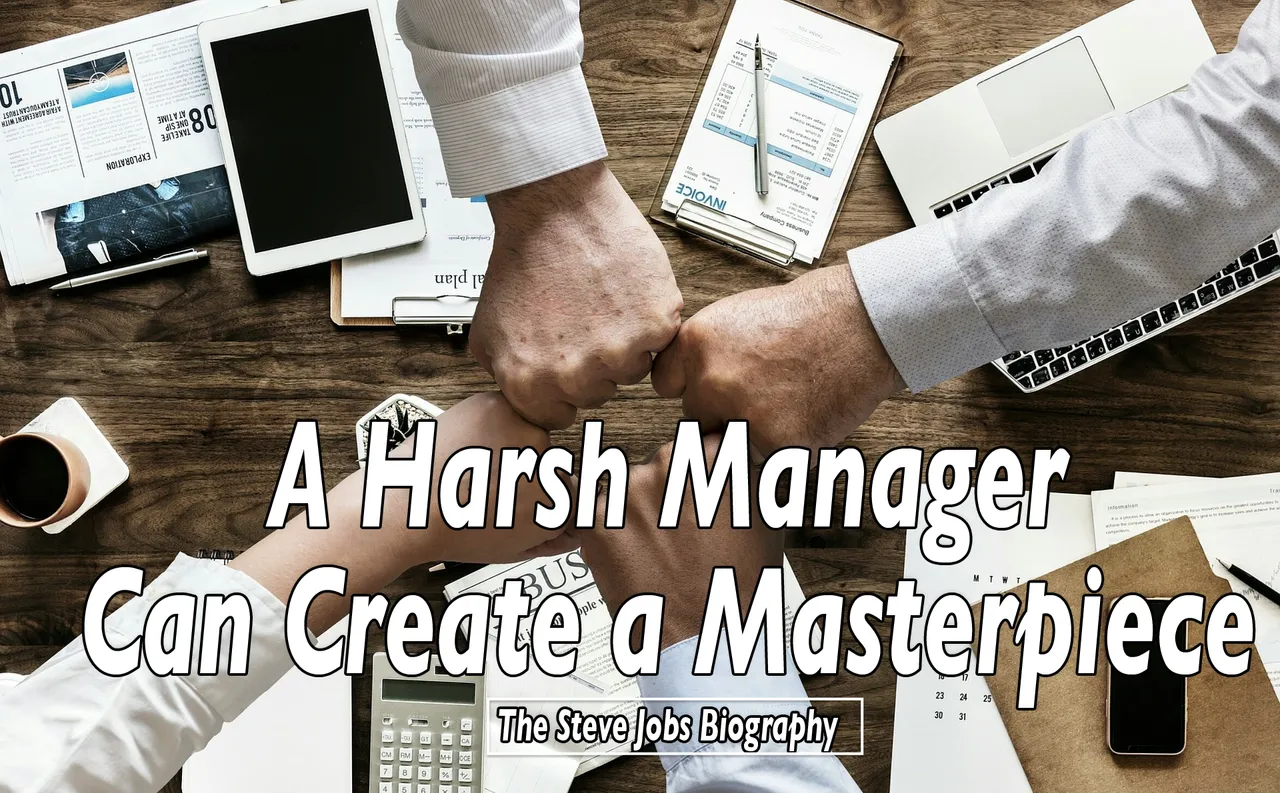
Steve Jobs put extreme demands on his employees - physically, mentally and emotionally. The strains of working under him are noted by many different employees in this biography and the interesting thing to notice is that there is a binary divide between employees as to whether Jobs's style of management was motivating or demoralizing.
With the benefit of hindsight, we now have sleek and powerful Apple products, which was the goal that Jobs had set out to achieve from the beginning. To achieve this goal over time, he enforced a very intense work environment that many people found abusive and extremely motivating at the same time.
“There were some upsides to Jobs’s demanding and wounding behavior. People who were not crushed ended up being stronger. They did better work, out of both fear and an eagerness to please. “His behavior can be emotionally draining, but if you survive, it works,” Hoffman said. You could also push back—sometimes—and not only survive but thrive.
Be calm and be confident - you might expect employees to be completely afraid of Jobs and never stand up to him, but when you read about the stories from the Mac team, it's clear that the employees who stood up to Jobs and exuded calm confidence in their work were the ones who earned his respect and got promoted within the company.
That didn’t always work; Raskin tried it, succeeded for a while, and then was destroyed. But if you were calmly confident, if Jobs sized you up and decided that you knew what you were doing, he would respect you. In both his personal and his professional life over the years, his inner circle tended to include many more strong people than toadies.”
This Perfectly Shows the Culture of the Mac Team:
The Mac team, which was headed by Jobs has a really interesting culture. They took the idea of standing up to Jobs and created a yearly award that was given to whoever did the best job of standing up to Jobs.
“The award was partly a joke, but also partly real, and Jobs knew about it and liked it.”
It's amazing to imagine a team of incredibly talented individuals who work together to make amazing products for a boss who snaps at them at one moment and then the next moment rewards them for standing up to him. Jobs's style of leadership was to demand the highest level of output from his employees while berating them to get it. Working hard and doing good work wasn't enough for Jobs, you had to fully believe in the work that you did and then stand up to him when he questioned it.
“I remember being envious of Joanna, because she would stand up to Steve and I didn’t have the nerve yet,” said Debi Coleman, who joined the Mac team that year. “Then, in 1983, I got the award. I had learned you had to stand up for what you believe, which Steve respected. I started getting promoted by him after that.” Eventually she rose to become head of manufacturing.”
A Great Example of the Effectiveness of His Leadership:
According to his employees, Jobs also had an incredible ability to get you to see the bigger picture. Seeing this bigger picture motivated his team to make incredible improvements that people thought would be impossible to achieve. This is my favorite story of how Jobs's leadership led to a vast improvement in the end product:
“One day Jobs came into the cubicle of Larry Kenyon, an engineer who was working on the Macintosh operating system, and complained that it was taking too long to boot up. Kenyon started to explain, but Jobs cut him off. “If it could save a person’s life, would you find a way to shave ten seconds off the boot time?” he asked. Kenyon allowed that he probably could.
Jobs went to a whiteboard and showed that if there were five million people using the Mac, and it took ten seconds extra to turn it on every day, that added up to three hundred million or so hours per year that people would save, which was the equivalent of at least one hundred lifetimes saved per year. “Larry was suitably impressed, and a few weeks later he came back and it booted up twenty-eight seconds faster,” Atkinson recalled. “Steve had a way of motivating by looking at the bigger picture.”
At the end of the day, the Mac team adopted an intense passion for making "a great product, not just a profitable one." Jobs forced this culture into the team and if anyone pushed back against making the best possible product, he would immediately replace them for someone who could share his passion for creating a masterpiece. Jobs approached creating products the same way an artist approaches a canvas - he has a vision in his mind and he will stop at nothing to make it a perfect reality. Those around him are forced to believe in his vision and do everything in their power to help him make it a reality.
Current Book & Quotes from: Steve Jobs by Walter Isaacson

Here's the Question of The Day, don't forget to post your answers in the comments!
Do you think Jobs was too harsh on his employees or do you think he was a necessary evil in order to create the best possible product?
Thanks for reading! Don't forget to leave your thoughts below and I look forward to seeing you in the comments!
